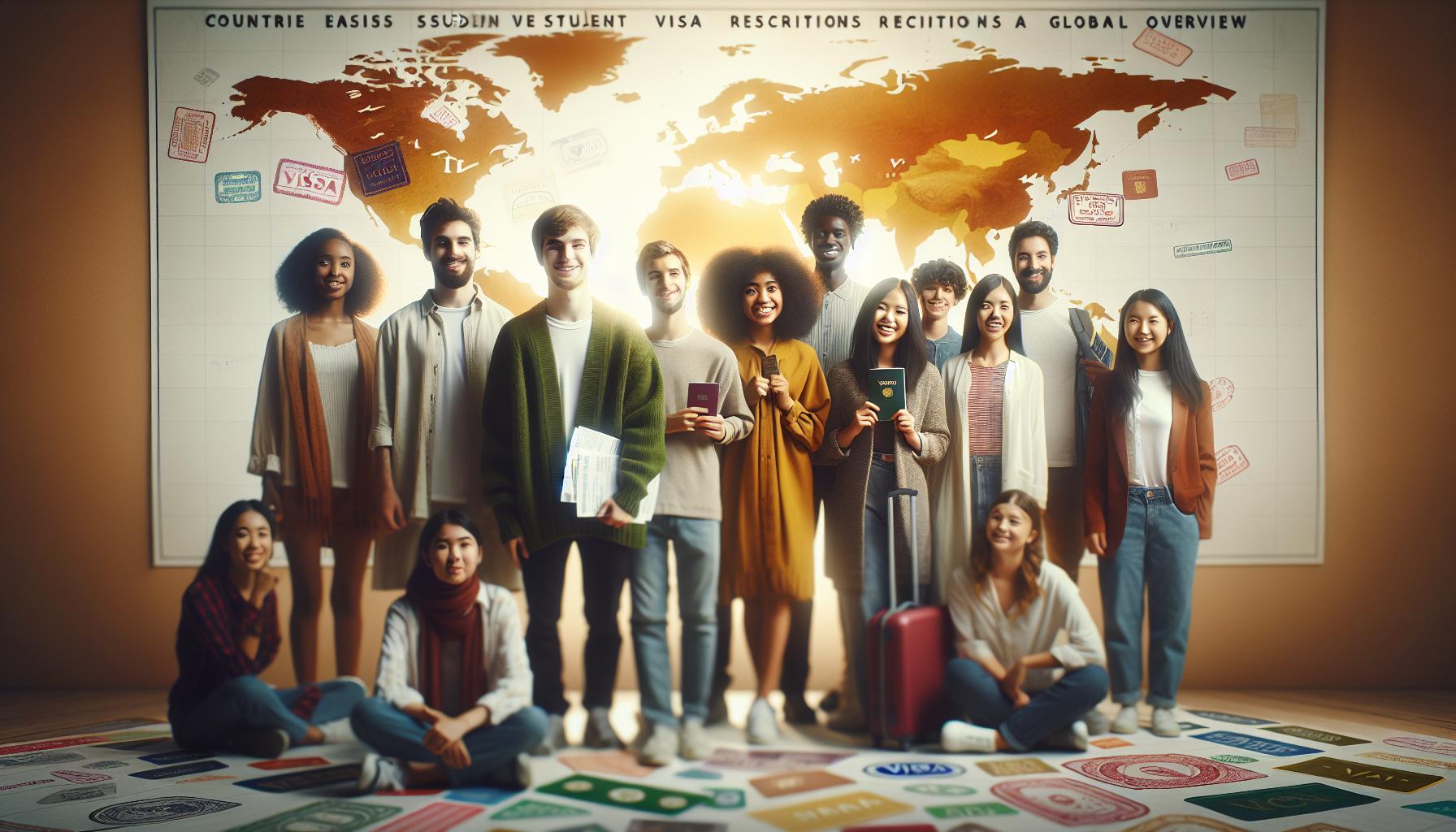Navigating the complexities of student visa regulations is a common hurdle for many aspiring international students. As restrictions tighten, understanding when these limitations might ease becomes crucial for those hoping to study in the U.S. With the potential for increased flexibility on student work options and program engagement, students are left to wonder how these changes can impact their journey. By exploring the timelines, requirements, and implications surrounding visa adjustments, this article aims to shed light on this pressing issue. Join us as we delve deeper into the factors that could signal a shift in student visa constraints, providing you with the information you need to plan your academic future effectively.
When Will the Latest Student Visa Changes Take Effect?
Understanding the landscape of student visa regulations can be complex, especially with recent updates making waves in international education. While specifics about when the latest student visa changes will take effect are influenced by government announcements, it is essential for prospective students to stay informed. Generally, changes in student visa policies are often announced months in advance, providing time for students to adjust their applications and plans accordingly. For instance, if new restrictions or relaxing of rules are expected to take effect in 2025, universities and governmental agencies would likely communicate these updates early to allow students sufficient time to prepare.
Given the fluctuations in global immigration policies, it’s prudent for students to regularly check relevant resources, such as government websites and educational organizations like NAFSA, to receive accurate and updated information on visa rules. Additionally, joining forums or support groups for international students can provide timely insights from those undergoing the same processes. Understanding these timelines can significantly impact students’ plans, including the choice of programs, applying for scholarships, or opting for alternative visa options if necessary.
Moreover, it’s crucial to note that while changes in regulations may lead to confusion or concern, they also present an opportunity for students to re-evaluate their paths. Students can use this time to enhance their applications, gather additional documentation, or seek guidance from educational counselors. A proactive approach can help students navigate the transition smoothly, ensuring they are better equipped to meet the new requirements when they come into effect.
Understanding the Current Student Visa Limitations
Navigating the complexities of student visa limitations can often feel overwhelming, given the various factors at play, including geopolitical changes and regulatory adjustments. Currently, specific restrictions are creating hurdles for many international students, significantly impacting their academic journeys. For instance, certain nationalities face extensive restrictions that complicate their options, stemming from policies designed to protect national security. This situation can lead to delays in visa application processing and uncertainty regarding eligibility, leaving prospective students to reconsider their plans.
To better understand the landscape, it’s essential to recognize that visa limitations are not uniform; they can vary based on the applicant’s country of origin and the specific type of visa sought. Countries subject to restrictions, such as those mentioned in recent Presidential Proclamations, may have little to no access to certain visa categories, hindering opportunities for education abroad. Additionally, changes in U.S. immigration policy-such as those anticipated to take effect in 2025-can lead to a revised framework that international students must adapt to, sometimes on short notice. Hence, staying informed through official educational resources or legal advisories becomes crucial as these changes unfold.
In light of these challenges, students can take proactive steps to enhance their chances of a successful visa application. Here are a few practical strategies:
- Gather Documentation: Start collecting your academic records, financial statements, and any other required documentation early, ensuring completeness and accuracy.
- Seek Guidance: Connect with educational consultants or international student offices at your desired institution to gain insights on navigating current restrictions.
- Stay Updated: Regularly check government and educational websites for the latest news on policy changes that could affect visa applications.
- Explore Alternatives: Consider options like different visa categories or online programs offered by universities that may have fewer restrictions.
By taking these proactive measures and leveraging available resources, prospective students can better navigate the often tumultuous waters of international higher education. The current limitations may pose challenges, but they also drive innovation and resilience among students looking to pursue their academic dreams.
Key Factors Impacting Student Visa Processing Times

Processing times for student visas can significantly influence prospective students’ plans and academic aspirations. Understanding the key factors that affect these timelines will empower students to better navigate the application process and plan their educational journeys effectively.
One major factor impacting visa processing times is the volume of applications received by U.S. consulates and embassies. During peak application seasons, such as before the fall semester, students may experience longer wait times due to an influx of applicants. Students should consider applying as early as possible, ideally as soon as they receive their Form I-20 from their educational institution. This proactive approach can help mitigate delays and ensure timely visa appointments-especially important as some consulates may implement additional scrutiny based on country-specific restrictions or security protocols.
Another important element is the applicant’s country of origin. Visa restrictions and processing backlogs can vary significantly among different countries, influenced by geopolitical factors and diplomatic relations with the United States. For example, students from countries facing travel bans or heightened security checks may encounter longer review periods. Staying informed about current immigration policies and regional developments is crucial for international students, as timely adjustments to application strategies can lead to more favorable outcomes.
Preparation and accuracy in documentation can also streamline the processing experience. Incomplete or incorrect applications are a common source of delays. Ensuring that all required documents, such as financial statements and proof of academic enrollment, are correctly submitted can expedite the review process. Utilizing resources from educational consultants or university international offices to verify application materials can provide an additional layer of support.
Students can also benefit from understanding changes in immigration policy and their implications. Legislative shifts can lead to a re-evaluation of the visa process, impacting overall timelines. For instance, as discussions around student visa reforms evolve, staying attuned to announcements from the U.S. Department of State and educational authorities will help students anticipate and adapt to any forthcoming changes.
By remaining informed and organized, and actively managing application timelines, international students can enhance their chances of overcoming processing delays and achieving their academic goals in the United States.
Countries Easing Student Visa Restrictions: A Global Overview

In recent years, several countries have taken significant steps to ease restrictions on student visas, creating more opportunities for international students to pursue their academic goals abroad. This trend is driven by a global recognition of the economic and cultural benefits that international students bring to host countries. For students considering their options for study abroad, it’s essential to stay informed about these developments, as they can dramatically alter the landscape of opportunities available.
Countries like Canada and Australia have streamlined their visa processes to attract foreign students with more flexible requirements. For instance, Canada has introduced programs that allow students to work while studying, leading to a smoother transition into the workforce post-graduation. Similarly, Australia has announced plans to expand post-study work rights, enabling graduates to gain valuable experience after completing their degrees. Such policies not only facilitate the educational journey but also enhance employability, making these destinations appealing.
In Europe, nations like Germany and the Netherlands are becoming increasingly welcoming to international students. Germany, known for its high-quality education, has eliminated tuition fees for many international students and offers a range of programs taught in English. The Netherlands has followed suit by providing extensive scholarships and simplifying its visa application process for those studying in certain fields.
As countries like the United Kingdom and the United States also consider policies that make it easier for students to obtain visas, the global student community is witnessing a shift towards greater inclusivity and accessibility. Prospective students should actively explore specific countries’ immigration policies and potential benefits, including scholarships, work rights, and post-graduation opportunities. Taking the time to research and apply to these countries can enhance the experience of studying abroad and contribute positively to their future career paths.
How to Navigate Current Student Visa Regulations

Navigating the complexities of student visa regulations can be daunting, yet understanding the process is crucial for international students eager to study abroad. With regulations constantly evolving, particularly in light of recent geopolitical and economic shifts, students must stay informed to ensure compliance and maximize their opportunities. Here’s how to approach these regulations effectively.
First, familiarize yourself with the specific requirements of the host country. Each nation has distinct eligibility criteria, application procedures, and documentation needs. For instance, students may need to prove sufficient financial resources, demonstrate proficiency in the language of instruction, and secure a letter of admission from an accredited institution. Utilize official government websites and university resources to gain insights into these requirements, as they often provide updated information that can significantly impact the application process.
Secondly, consider the timelines involved. Visa processing times can vary widely; some countries offer expedited services, while others may take several months. Start your application early, allowing ample time for any unforeseen delays. Many universities have resources dedicated to supporting international students through the visa process, so don’t hesitate to reach out to these offices for guidance tailored to your situation. They can often provide insights into typical wait times and even assist with document reviews.
Furthermore, it’s vital to stay aware of any policy changes that may affect your visa status. Recent discussions around enhanced vetting procedures and increased scrutiny of applications have drawn attention to the importance of transparency in your application. Ensure that all aspects of your application accurately reflect your intentions and qualifications, as inconsistencies may raise red flags.
Lastly, engage with student communities either online or in-person. Other international students can be excellent resources, sharing firsthand experiences regarding challenges they’ve faced and how they navigated similar situations. By building a support network, you not only gain valuable information but also create a sense of camaraderie that can alleviate the stress associated with the visa application process.
With thorough preparation and proactive engagement, navigating current student visa regulations can become a manageable task. Taking these steps ensures that you remain compliant while maximizing your potential for academic success and personal growth during your time abroad.
What Students Should Know About Visa Compliance
Understanding the intricacies of visa compliance is vital for international students navigating the challenges of studying abroad. Maintaining your legal status not only ensures that you can continue your education but also protects your future opportunities in the host country. Compliance involves adhering to the rules set by immigration authorities, which can vary significantly based on your visa type, such as F-1 or J-1 categories.
To remain in good standing, it’s essential to keep track of your visa’s conditions. This includes being enrolled full-time in your program, notifying your Designated School Official (DSO) of any changes to your study plans, and refraining from unauthorized work. Regular check-ins with your DSO can provide clarity and updates on your status. They are your go-to resource for understanding everything from maintaining status during breaks to what you need to do if you decide to transfer schools.
Given that regulations can evolve, staying informed about potential changes is crucial. Subscribe to updates from relevant immigration resources or consult your university’s international office, which often hosts workshops and provides materials on compliance. Connecting with other students can also be helpful; by sharing experiences and advice, you can form a supportive community that can help each other navigate challenges effectively.
In practice, here are a few practical steps to ensure compliance:
- Keep Documents Updated: Regularly check that your I-20 or DS-2019 is up to date, including program start and end dates.
- Understand Work Limitations: Know the specific regulations regarding on-campus work, internships, and practical training.
- Plan Ahead: If you’re considering a change in your studies or address, discuss it with your DSO sooner rather than later.
By proactively managing your visa compliance, you’ll not only alleviate stress but also enhance your academic journey and personal growth while studying abroad.
Tips for Preparing Your Student Visa Application
Preparing your student visa application is a vital step that can shape your academic journey in a new country. With the landscape of student visas evolving, understanding how to approach your application can make a significant difference. Here are some practical tips to streamline the process and enhance your chances of approval.
Start by ensuring you have all necessary documents organized and easily accessible. Key items typically include your passport, a valid Form I-20 or DS-2019, proof of financial support, and any academic transcripts. It’s also beneficial to have a detailed plan for your studies, explaining why you’ve chosen your specific program and institution. A well-prepared application reflects your commitment and understanding of the process.
Understanding Application Requirements
Every country has distinct requirements for student visas. Familiarize yourself with these by visiting official immigration websites or consulting your prospective school’s international office. Note essential deadlines, including application dates, interview schedules, and document submissions. Remember, late applications can lead to missed opportunities, so creating a timeline can help keep you on track.
Furthermore, practice for your visa interview. Familiarize yourself with common questions regarding your intentions to study, return plans to your home country, and how you plan to support yourself financially while studying. This preparation not only builds confidence but also allows you to present a compelling narrative about your academic goals and commitment to your studies.
Financial Preparation
Demonstrating adequate financial support is critical for securing your student visa. This typically means providing bank statements, scholarship letters, or sponsorship documents that clearly outline your ability to cover tuition fees and living expenses throughout your studies. If possible, create a budget that specifies your expected monthly expenditures, helping illustrate your financial preparedness.
Lastly, completing your visa application in a timely manner can alleviate stress and leave room for any unexpected issues that may arise. Double-check your application for accuracy and completeness, as mistakes or omissions may lead to delays or denials. Utilizing checklists can ensure nothing is overlooked.
By following these steps and remaining proactive in your approach, you’ll set a solid foundation for your student visa application, paving the way for a rewarding educational experience abroad.
Exploring Alternative Visa Options for International Students
Finding paths to study abroad can feel daunting, especially in a landscape of fluctuating student visa policies. However, international students have various options beyond the traditional student visa route that can pave the way for an enriching educational experience. Exploring these alternatives may unlock new doors and help aspiring students navigate the complexities of international education.
Alternative Visa Categories
Generally, student visas dominate the discourse for studying in foreign countries, yet there are many alternative visa options that can serve specific needs. For instance:
- Visitor Visa: In some cases, students may pursue short-term courses or exchange programs under a visitor visa. This allows them to study without committing long-term, ideal for language courses or workshops.
- Work and Study Visas: Certain countries, like Australia and Canada, offer work and study visas that allow students to take on part-time work while studying. This can ease financial strain and provide valuable work experience.
- Research or Academic Exchange Visas: Students aiming to engage in significant research or participate in student exchange programs might explore academic or research visas that are often less restricted.
Leveraging Education Pathways
Many countries have established programs facilitating pathways to education adjusted by temporary visas. For instance, if you are looking to enroll in a longer program, consider applying for a visa that allows for a temporary study or internship, which can later transition into a long-term student visa. This approach can be particularly beneficial in countries like New Zealand, where students can apply for a post-study work visa after completing their studies-providing an immediate opportunity to gain local experience.
Seeking Consulting Services
Navigating visa alternatives can be overwhelming, and it might be beneficial to seek assistance from educational consultants or immigration lawyers. These professionals can provide personalized guidance based on your individual circumstances, helping to identify the best route tailored to your academic and career aspirations. They can also assist you in understanding the intricate legal requirements for different visa categories, timelines, and applications.
By keeping these alternatives in mind-and remaining adaptable-students can transition through the often complex and restricted landscape of international education more smoothly. Combining diligent research and strategic planning can significantly enhance your chances of sustainable success in studying abroad.
Impact of Policy Changes on Future Student Visa Applicants
Considering the shifting landscape of student visa policies, new regulations can have far-reaching impacts on future applicants. As countries update their visa frameworks, it’s essential for potential students to stay informed about these changes and understand how they might alter their study abroad experiences. A common question arises: when can we expect these visa limitations to ease, and what does this mean for students hoping to study internationally?
Many countries are reviewing their visa protocols to attract more international students, recognizing their contributions to local economies and cultural diversity. This influx might lead to a broader range of visa options, streamlined application procedures, and reduced processing times. For example, recent calls for action by higher education organizations emphasize the need for expedited processing of F-1 and J-1 visas in the United States due to noticeable delays, pointing toward potential reforms aimed at making the system more efficient[[2]](https://www.acenet.edu/Policy-Advocacy/Pages/Immigration/Immigration-and-International-Students.aspx).
However, students must also be aware of the challenges presented by changes that may not directly favor their applications. For instance, stricter immigration policies could arise alongside relaxation measures, introducing complications such as increased scrutiny over application materials or tighter regulations for internships and work placements during studies. Prospective students should prepare to navigate these new hurdles, which may require a more robust application strategy, including demonstrating financial stability or academic credentials.
To successfully adapt to these evolving policies, students should actively seek information from reliable sources, such as official embassy websites or educational consultants. Keeping an eye on trends in global education, maintaining compliance with visa regulations, and staying adaptable to policy changes can significantly enhance their chances of smoothly transitioning into their desired programs. By taking proactive steps and understanding the implications of these policy shifts, students can position themselves for success in their international education journeys.
The Role of Economic Factors in Visa Availability
Navigating the world of student visas can often feel like walking a tightrope, especially when economic factors come into play. Countries are increasingly recognizing the vital role international students play in fueling local economies, leading to shifts in visa policies aimed at attracting these individuals. Economic considerations often dictate the availability of student visas, influencing factors such as processing times, eligibility criteria, and the overall ease of application. Understanding these elements is crucial for prospective students seeking to embark on their academic journeys abroad.
As economies fluctuate, so too do the policies that govern international student admissions. For instance, when a nation experiences an economic downturn, it may impose stricter regulations on student visas to prioritize domestic workers. Conversely, during periods of growth, governments may seek to attract talent from abroad, resulting in more lenient visa policies. This ebb and flow directly affects how quickly a student can secure their visa and enter a new academic environment. Students should stay informed about the economic climate of their chosen study destination, as a thriving economy typically correlates with a more welcoming approach to international students.
Moreover, the demand for skilled labor can lead to opportunities for students post-graduation. Many countries offer pathways for international students to stay and work after their studies, directly linked to their economic needs. For example, nations facing labor shortages might enhance their post-study work options, making it easier for students to transition into the workforce. Understanding these correlations can empower students to make informed decisions about their study destinations based on current economic trends and future opportunities.
To navigate these economic landscapes effectively, students should consider implementing a multifaceted strategy that includes building strong academic credentials, gaining relevant work experience, and demonstrating financial stability. Engaging with local educational consultants or leveraging resources from universities can also provide deeper insights into the current economic factors influencing visa availability and requirements. By staying proactive and adaptable, students can turn challenges into opportunities, setting the stage for successful international study experiences.
Student Support Resources for Visa Challenges
Navigating visa challenges as an international student can be daunting, but there are numerous support resources available designed to ease the process and empower you through every step. Many universities offer dedicated international student offices that provide essential services including visa counseling, workshops on application procedures, and connections to legal resources. Being proactive in utilizing these services can significantly reduce stress during your visa journey.
Another valuable resource is community organizations that specialize in immigrant support. These groups often host informational sessions covering topics from visa regulations to work permits, and they can offer insights tailored to your nationality or academic field. Engaging with your peers through student organizations focused on international students can also provide a network of support. Sharing experiences and advice with fellow students who have navigated similar challenges can help you feel less isolated and more equipped to handle the complexities associated with visa applications.
Moreover, online platforms and forums serve as excellent spaces for gathering information and receiving assistance. Websites such as the U.S. Citizenship and Immigration Services (USCIS) provide official guidelines on visa categories and requirements. Social media groups related to your specific study destination can be particularly useful for real-time advice and updates on visa matters. Joining these online communities enables you to stay informed about changes in policies and share tips with students who are in the same situation.
As you prepare for your visa application, consider organizing a checklist of all required documents and deadlines. Here are some tips to make this process smoother:
- Understand Visa Requirements: Familiarize yourself with the specific requirements based on your country of origin and the nature of your studies.
- Document Preparation: Ensure that all personal, academic, and financial documents are in order and readily accessible for your application.
- Stay Informed: Regularly check for updates concerning visa regulations from reliable sources, as policies can change frequently.
- Engage with Advisors: Don’t hesitate to reach out to academic advisors or immigration officials when uncertainties arise.
By leveraging these valuable resources and incorporating practical strategies into your planning, you can navigate visa challenges more confidently, setting a positive tone for your academic journey ahead. Remember, support is out there; using it can make all the difference in ensuring your international experience is both enriching and successful.
Success Stories: Students Who Overcame Visa Limitations
Many international students have successfully navigated the complexities of student visa limitations and emerged stronger and more resilient. Consider the journey of Maya from India, who faced significant hurdles in securing her F-1 visa. When she applied, the U.S. consulates had paused scheduling new appointments due to heightened scrutiny and security measures. Instead of losing hope, Maya utilized the resources available at her university’s international office. They provided guidance on how to articulate her academic goals and the importance of studying in the U.S. in her visa interview.
In another inspiring case, Lucas from Brazil had his visa application initially denied due to incomplete documentation. Rather than giving up, he took the opportunity to connect with a supportive community of students who had encountered similar challenges. Through networking, Lucas learned about the intricacies of the visa application process and was able to compile a robust application on his second attempt, eventually landing his dream internship after securing his visa.
Strategies for Overcoming Visa Limitations
Success stories like Maya’s and Lucas’s highlight several strategies that all students can adopt to overcome visa limitations:
- Utilize University Resources: Engage actively with the international student office for personalized support and guidance.
- Build a Support Network: Join student organizations or online forums where you can share experiences and receive advice from peers.
- Stay Informed: Regularly check for policy updates and understand how changes might impact your situation.
- Be Persistent: Don’t lose hope after initial setbacks; learn from them and reapply with a stronger case.
These examples serve as a testament to the adaptability and determination of international students. By leveraging resources effectively, maintaining perseverance, and drawing on community support, it is possible to navigate the visa process successfully, paving the way for a transformative educational experience.
Faq
Q: When can we expect student visa limitations to ease?
A: The easing of student visa limitations will depend on various factors such as changes in immigration policies, global health conditions, and international relations. Monitoring updates from the U.S. Department of State and USCIS can provide insights into when changes might take effect.
Q: What factors contribute to the current student visa restrictions?
A: Current student visa restrictions are often influenced by policy shifts, security concerns, and processing capacity at U.S. embassies. Understanding these factors can help applicants strategize their visa applications more effectively.
Q: How do government policies affect student visa processing times?
A: Government policies directly impact student visa processing times by determining resource allocation and application scrutiny levels. Keeping abreast of policy updates can help applicants anticipate potential delays or changes in processing.
Q: Will the global economic situation impact student visa availability?
A: Yes, the global economic situation can influence student visa availability by affecting funding for international education and the overall interest in studying abroad. Economic recovery may lead to more relaxed visa regulations.
Q: How can students navigate the current limitations on student visas?
A: Students can navigate current limitations by gathering complete documentation, ensuring compliance with visa regulations, and staying informed about changes. Utilizing resources provided by educational institutions can also offer guidance.
Q: Are there alternative visa options for students facing restrictions?
A: Yes, students can explore alternative visa options such as visitor visas or specialized programs that might allow for study without a traditional student visa. It’s essential to consult immigration services to ensure compliance.
Q: What role does public health play in student visa policies?
A: Public health considerations, especially regarding events like pandemics, significantly influence student visa policies. These factors can lead to stricter entry requirements or temporary visa suspension, which students should monitor closely.
Q: How can students prepare for potential future changes in visa regulations?
A: Students can prepare for future changes by staying informed, maintaining good academic standing, and being flexible with their plans. Regularly checking reliable resources will better equip them to adapt to any new regulations.
Closing Remarks
As we explore the evolving landscape of student visas, it’s clear that understanding these limitations is crucial for your academic journey. While the current restrictions can be challenging, remaining informed and proactive can make all the difference. For those curious about how to navigate these complex regulations, check out our detailed guides on student visa applications and university admissions to equip yourself with the necessary tools and insights.
Don’t let confusion hold you back-stay ahead by subscribing to our newsletter for the latest updates and valuable resources. Your path to success is our priority, so feel free to leave a comment with any questions or concerns. Together, we can tackle these challenges and empower each other to thrive in academia and beyond!









